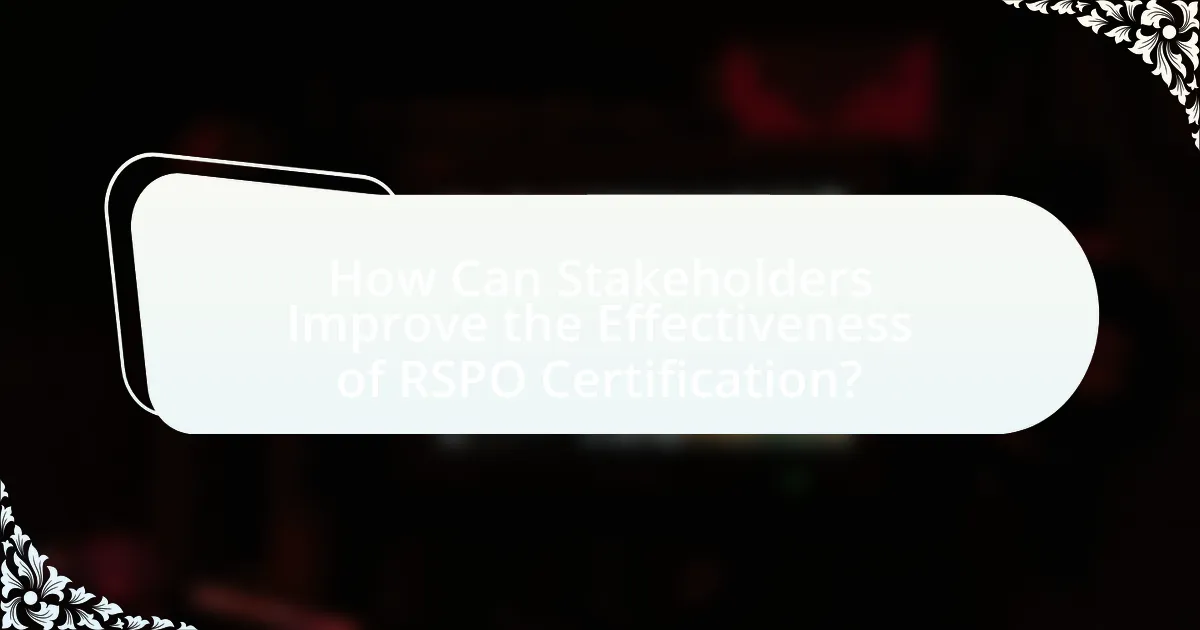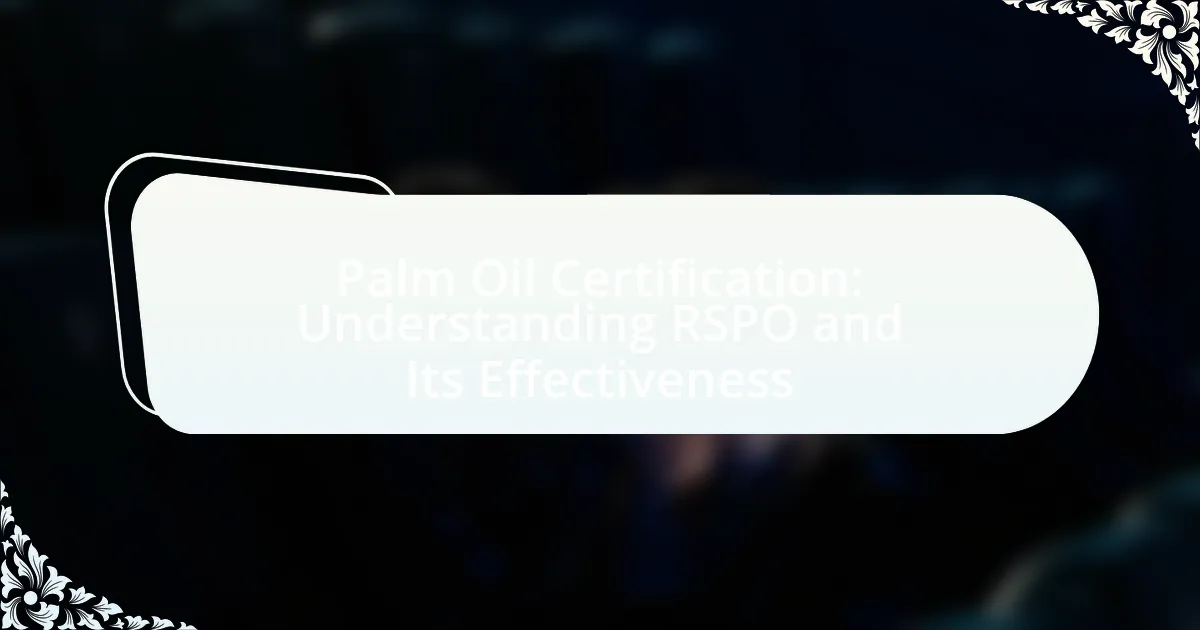Palm oil certification, particularly through the Roundtable on Sustainable Palm Oil (RSPO), is a critical process that ensures palm oil is produced sustainably, adhering to environmental and social standards. The article outlines the certification process, including the key steps and criteria required for compliance, and discusses the objectives of RSPO certification in promoting responsible palm oil production. It also addresses the challenges and criticisms faced by the certification system, such as enforcement issues and transparency concerns, while highlighting the role of stakeholders, including consumers, in enhancing the effectiveness of RSPO certification. Additionally, the article explores innovative approaches and future trends in palm oil certification and sustainability, emphasizing the importance of collaboration and technology in improving outcomes.

What is Palm Oil Certification and Why is it Important?
Palm oil certification is a process that verifies that palm oil is produced sustainably, adhering to specific environmental and social standards. This certification is important because it helps mitigate deforestation, promotes biodiversity, and ensures fair labor practices in palm oil production. The Roundtable on Sustainable Palm Oil (RSPO) is a leading organization that sets these standards, and as of 2021, over 20% of global palm oil production is certified by RSPO, demonstrating its growing significance in promoting sustainable agricultural practices.
How does the RSPO certification process work?
The RSPO certification process involves several key steps to ensure that palm oil is produced sustainably. First, producers must comply with the RSPO Principles and Criteria, which outline environmental and social standards. Next, they submit an application for certification to an RSPO-approved certification body. This body conducts an initial assessment, including document reviews and on-site audits, to verify compliance with the standards. Following a successful assessment, the certification body issues a certificate, which is valid for five years, subject to annual surveillance audits to ensure ongoing compliance. The RSPO maintains a public database of certified producers, enhancing transparency and accountability in the palm oil supply chain.
What are the key steps involved in obtaining RSPO certification?
The key steps involved in obtaining RSPO certification include the following: first, a company must become a member of the Roundtable on Sustainable Palm Oil (RSPO). Next, the company conducts a self-assessment against the RSPO Principles and Criteria to identify compliance gaps. Following this, the company must implement necessary changes to meet the criteria. Afterward, an independent third-party auditor is engaged to conduct an assessment of the company’s operations. Once the assessment is complete, the auditor submits a report to RSPO, which then decides on certification. If successful, the company receives its RSPO certificate, allowing it to market its palm oil as sustainably produced. These steps ensure adherence to sustainability standards set by RSPO, which has over 4,000 members globally, promoting responsible palm oil production.
What criteria must be met for RSPO certification?
RSPO certification requires compliance with several criteria focused on sustainable palm oil production. These criteria include adherence to environmental responsibility, social equity, and economic viability. Specifically, producers must demonstrate no deforestation, respect for human rights, fair labor practices, and the protection of biodiversity. Additionally, they must implement measures to reduce greenhouse gas emissions and ensure traceability of palm oil products. The RSPO has established these criteria to promote sustainable practices and improve the overall impact of palm oil cultivation on the environment and communities.
What are the main objectives of RSPO certification?
The main objectives of RSPO certification are to promote the sustainable production of palm oil and to ensure that palm oil is produced in an environmentally and socially responsible manner. RSPO certification aims to reduce deforestation, protect biodiversity, and uphold the rights of workers and local communities involved in palm oil production. The certification process includes adherence to specific criteria that address environmental impact, social responsibility, and economic viability, thereby ensuring that certified palm oil meets rigorous sustainability standards.
How does RSPO certification contribute to sustainable palm oil production?
RSPO certification contributes to sustainable palm oil production by establishing a set of environmental and social criteria that producers must meet to ensure responsible practices. This certification process promotes the protection of biodiversity, reduction of greenhouse gas emissions, and respect for the rights of workers and local communities. For instance, RSPO members are required to adhere to principles that prevent deforestation and promote sustainable land use, which helps mitigate the negative impacts of palm oil cultivation on ecosystems. Additionally, as of 2021, over 4.5 million hectares of palm oil plantations are certified under RSPO, demonstrating a significant commitment to sustainable practices in the industry.
What impact does RSPO certification have on environmental conservation?
RSPO certification significantly impacts environmental conservation by promoting sustainable palm oil production practices that reduce deforestation and habitat destruction. The certification requires adherence to strict environmental criteria, including the protection of high conservation value areas and the implementation of measures to minimize greenhouse gas emissions. According to the RSPO’s own reports, certified producers have shown a reduction in deforestation rates compared to non-certified producers, contributing to the preservation of biodiversity and ecosystems. Furthermore, studies indicate that RSPO-certified palm oil has a lower environmental footprint, as it encourages responsible land use and sustainable agricultural practices, thereby supporting overall environmental conservation efforts.

What are the Challenges and Criticisms of RSPO Certification?
The challenges and criticisms of RSPO certification include issues related to the effectiveness of its standards, enforcement, and transparency. Critics argue that the certification process can be inconsistent, leading to variations in compliance among producers, which undermines the credibility of the certification. Additionally, there are concerns about the lack of rigorous monitoring and enforcement mechanisms, allowing some certified producers to engage in practices that contradict RSPO principles. Transparency is another significant issue, as stakeholders often find it difficult to access information about the certification process and the performance of certified companies. These challenges highlight the need for improvements in the RSPO framework to enhance its reliability and impact on sustainable palm oil production.
Why do some stakeholders question the effectiveness of RSPO certification?
Some stakeholders question the effectiveness of RSPO certification due to concerns about its implementation and enforcement. Critics argue that the certification process lacks rigorous monitoring and transparency, leading to instances of non-compliance among certified producers. For example, a report by the Forest Peoples Programme highlighted cases where RSPO-certified plantations continued to engage in deforestation and land conflicts, undermining the credibility of the certification. Additionally, stakeholders express skepticism about the ability of RSPO to address social issues, such as labor rights and community engagement, which are essential for sustainable palm oil production.
What are the common criticisms regarding the implementation of RSPO standards?
Common criticisms regarding the implementation of RSPO standards include insufficient enforcement of compliance, lack of transparency in the certification process, and the perception that the standards do not adequately address deforestation and social issues. Critics argue that many certified plantations continue to engage in environmentally harmful practices, undermining the credibility of the RSPO. For instance, a report by the NGO Forest Peoples Programme highlighted cases where RSPO-certified palm oil was linked to land conflicts and violations of indigenous rights, indicating that the standards may not effectively protect vulnerable communities. Additionally, the complexity of the certification process can lead to inconsistencies in how standards are applied, further fueling skepticism about their effectiveness.
How do these criticisms affect the perception of RSPO certification?
Criticisms of RSPO certification significantly undermine its credibility and perceived effectiveness among stakeholders. For instance, allegations of insufficient enforcement of sustainability standards and instances of non-compliance by certified producers lead consumers and environmental groups to question the integrity of the certification process. A survey conducted by the World Wildlife Fund in 2021 indicated that 60% of consumers were skeptical about the environmental benefits of RSPO-certified palm oil due to these criticisms. This skepticism can result in decreased consumer trust and demand for RSPO-certified products, ultimately impacting the market dynamics for sustainably sourced palm oil.
What challenges do producers face in achieving RSPO certification?
Producers face several challenges in achieving RSPO certification, including high compliance costs, complex documentation requirements, and the need for ongoing monitoring and auditing. The financial burden of implementing sustainable practices can be significant, with estimates suggesting that compliance costs can reach up to 10% of total production costs. Additionally, the intricate nature of RSPO standards necessitates thorough documentation and traceability, which can overwhelm producers lacking adequate resources or expertise. Furthermore, maintaining certification requires continuous adherence to evolving standards, demanding regular audits and updates to practices, which can strain operational capacities.
What are the financial implications of obtaining RSPO certification for producers?
Obtaining RSPO certification has significant financial implications for producers, primarily involving both costs and potential revenue benefits. The costs include certification fees, compliance expenses, and investments in sustainable practices, which can range from thousands to tens of thousands of dollars depending on the scale of operations. However, certified producers often experience increased market access and premium pricing for their products, as consumers and businesses increasingly prefer sustainably sourced palm oil. For instance, a study by the World Wildlife Fund indicated that RSPO-certified palm oil can command prices up to 10% higher than non-certified oil, reflecting the growing demand for sustainable products. Thus, while the initial financial outlay for RSPO certification can be substantial, the long-term benefits in terms of market positioning and profitability can outweigh these costs.
How do local regulations impact the certification process?
Local regulations significantly influence the certification process by establishing specific criteria that must be met for compliance. These regulations can dictate environmental standards, labor practices, and land use policies that organizations must adhere to in order to achieve certification. For instance, in countries with stringent environmental laws, palm oil producers may be required to demonstrate sustainable practices that align with local biodiversity conservation efforts, thereby affecting their eligibility for certification under the Roundtable on Sustainable Palm Oil (RSPO) framework. This alignment with local regulations ensures that the certification process not only meets international standards but also respects and integrates local governance and ecological considerations.

How Can Stakeholders Improve the Effectiveness of RSPO Certification?
Stakeholders can improve the effectiveness of RSPO certification by actively engaging in transparent communication and collaboration throughout the supply chain. This includes sharing best practices, providing training for smallholders, and ensuring compliance with RSPO standards. For instance, companies that source palm oil can implement traceability systems to monitor their supply chains, which enhances accountability and encourages adherence to sustainable practices. Research indicates that companies with robust traceability systems are more likely to meet RSPO criteria, thereby increasing the overall credibility of the certification process. Additionally, stakeholders can invest in capacity-building initiatives that empower local communities, ensuring they understand and can meet RSPO requirements, which ultimately strengthens the certification’s impact on sustainable palm oil production.
What role do consumers play in supporting RSPO certification?
Consumers play a crucial role in supporting RSPO certification by choosing products that are certified sustainable palm oil. Their purchasing decisions directly influence market demand, encouraging manufacturers to source palm oil from RSPO-certified suppliers. According to the RSPO, consumer awareness and preference for certified products can drive significant changes in the palm oil industry, promoting sustainable practices and reducing deforestation. In 2020, a survey indicated that 66% of consumers were willing to pay more for products containing sustainably sourced palm oil, demonstrating the impact of consumer choices on industry practices.
How can consumer awareness influence sustainable palm oil practices?
Consumer awareness can significantly influence sustainable palm oil practices by driving demand for certified products, thereby encouraging producers to adopt environmentally friendly methods. When consumers are informed about the negative impacts of unsustainable palm oil production, such as deforestation and biodiversity loss, they are more likely to choose products that are certified by organizations like the Roundtable on Sustainable Palm Oil (RSPO). This increased demand for sustainable options compels manufacturers to source palm oil from certified suppliers, leading to improved agricultural practices and reduced environmental harm. According to a 2020 study published in the journal “Sustainability,” consumer awareness campaigns have been shown to increase the market share of sustainably sourced palm oil by up to 30%, demonstrating a direct correlation between informed consumers and sustainable practices in the palm oil industry.
What actions can consumers take to promote RSPO-certified products?
Consumers can promote RSPO-certified products by actively choosing to purchase items that carry the RSPO certification label. This action directly supports sustainable palm oil production and encourages manufacturers to source palm oil responsibly. Additionally, consumers can advocate for RSPO-certified products by raising awareness through social media, participating in campaigns, and engaging in discussions about the importance of sustainable palm oil. Research indicates that consumer demand significantly influences market trends, and a 2020 study by the World Wildlife Fund found that increased consumer awareness and preference for sustainable products can lead to a 30% rise in sales of certified goods.
What best practices can producers adopt to enhance their certification efforts?
Producers can enhance their certification efforts by implementing comprehensive sustainability practices that align with the Roundtable on Sustainable Palm Oil (RSPO) standards. These practices include conducting regular audits to ensure compliance with RSPO criteria, engaging in stakeholder consultations to address community concerns, and investing in training programs for workers to improve their understanding of sustainable practices. Research indicates that certified producers often experience increased market access and consumer trust, as demonstrated by a 2020 study published in the Journal of Cleaner Production, which found that RSPO-certified palm oil had a 20% higher market price compared to non-certified oil.
How can collaboration among stakeholders improve certification outcomes?
Collaboration among stakeholders can significantly improve certification outcomes by fostering shared goals, enhancing transparency, and facilitating knowledge exchange. When stakeholders, including producers, NGOs, and certifying bodies, work together, they can align their objectives, ensuring that certification standards meet the needs of all parties involved. This collective effort leads to more comprehensive assessments and better compliance with sustainability criteria. For instance, the Roundtable on Sustainable Palm Oil (RSPO) emphasizes multi-stakeholder engagement, which has been shown to increase the credibility and effectiveness of certification processes, as evidenced by the growing number of certified producers and the positive impact on environmental and social practices in palm oil production.
What innovative approaches can be implemented to address certification challenges?
Innovative approaches to address certification challenges in palm oil include the integration of blockchain technology for transparency, the use of remote sensing for monitoring compliance, and the development of mobile applications for real-time reporting by farmers. Blockchain technology enhances traceability by providing an immutable record of transactions, which can help verify the sustainability claims of palm oil producers. Remote sensing technologies, such as satellite imagery, enable continuous monitoring of land use changes and deforestation, ensuring adherence to certification standards. Mobile applications empower farmers by facilitating direct communication with certifying bodies, allowing for immediate feedback and support, thereby improving compliance rates. These methods collectively enhance the credibility and efficiency of the certification process, addressing existing challenges effectively.
What are the future trends in palm oil certification and sustainability?
Future trends in palm oil certification and sustainability include increased adoption of technology for traceability, enhanced stakeholder engagement, and stricter regulatory frameworks. The use of blockchain technology is expected to improve transparency in supply chains, allowing consumers to verify the sustainability of palm oil products. Additionally, organizations like the Roundtable on Sustainable Palm Oil (RSPO) are likely to expand their criteria to include social and environmental impacts more comprehensively, reflecting growing consumer demand for ethical sourcing. Research indicates that as of 2023, over 20% of global palm oil production is certified sustainable, highlighting a trend towards greater accountability and sustainability in the industry.

Leave a Reply